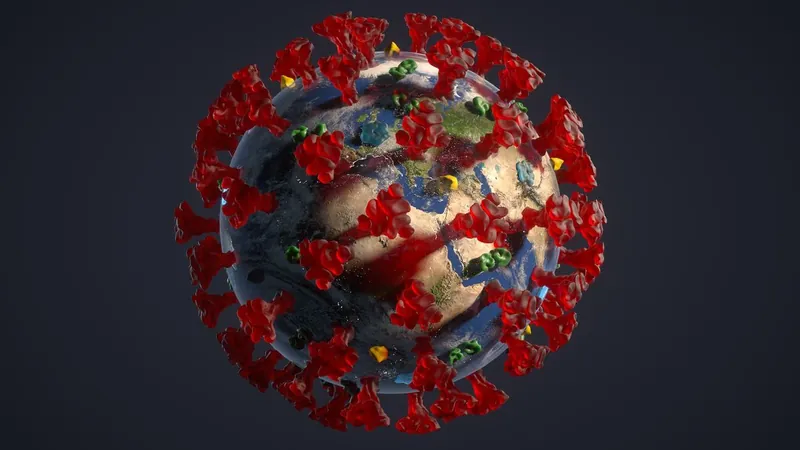
Brace Yourself: More Pandemics Could Be on the Horizon!
2024-12-26
Author: Jia
Pandemics on the Rise
Pandemics—the widespread outbreak of infectious diseases—are re-emerging as a significant threat to global health. Historical events like the devastating Black Death and the 1918 Spanish Flu infected millions and caused fatalities on an unprecedented scale. However, as we've entered the modern age, scientific advancements initially seemed to give us the upper hand: vaccines eradicated smallpox, polio is nearly gone, and antibiotics have treated countless bacterial infections. Yet, recent decades have seen a resurgence of pandemics, including HIV/AIDS in the 1980s, a series of flu outbreaks, SARS, and now COVID-19, which, despite public perceptions, is far from over.
The Role of Ecosystem Imbalance
Healthy ecosystems are crucial for our well-being, as they provide essential services such as clean water, air, food, and spaces for recreation. They also play a key role in regulating diseases. When ecosystems are in equilibrium—predators managing herbivore populations and herbivores controlling plant growth—pathogens find it difficult to spread and cause pandemics. Tragically, human activities like climate change and the destruction of biodiversity are throwing these systems off balance.
As temperatures rise, climate change allows disease-carrying insects, like mosquitoes, to invade new territories, potentially putting millions at risk for illnesses like dengue fever. For instance, studies in China have demonstrated how increasing temperatures could escalate the transmission of dengue, suggesting a global pattern that must be urgently addressed.
Furthermore, the loss of biodiversity alters food chains and ecosystems. When forests are cleared in regions like South America for cattle ranching, species such as vampire bats—previously limited by their food sources—can thrive unchecked. These bats are known carriers of the rabies virus, which can be fatal to humans. While rabies-related deaths have decreased in some regions due to vaccination efforts, the risk from other wildlife-borne diseases remains ominous.
The encroachment of urbanization and agriculture into natural habitats creates more opportunities for humans to interact with zoonotic diseases—those transmitted from animals. The connection between our actions and the emergence of diseases is stark; HIV first made its way into humans through the consumption of infected primate meat, while bats are suspected as the original reservoir for the virus responsible for COVID-19, which has claimed over 7 million lives globally.
Addressing Root Causes vs. Symptoms
The factors leading to pandemics—climate change, biodiversity loss, and increased human-animal interactions—are often described as the ultimate causes. On a more immediate level, factors like direct contact with infected animals are the proximate causes. For instance, while poverty-driven hunger leads to the hunting of bushmeat, it is the handling of infected animals that directly facilitates disease transmission.
Unfortunately, most health strategies focus solely on the immediate responses, failing to address these underlying issues. Measures such as lockdowns, mask mandates, and vaccination campaigns are essential, but they rarely tackle the broader environmental contexts that foster pandemics.
The Planetary Health Framework: A Path Forward
Emerging awareness of a "planetary health" approach is gaining momentum. This framework recognizes that human health is intricately linked to the health of our natural systems. It emphasizes addressing ultimate causes like habitat destruction and climate disruption while simultaneously tackling immediate health threats.
Adopting this dual approach can lead to better outcomes for both humans and the environment, creating a virtuous cycle of health and sustainability. Fortunately, many universities are beginning to integrate planetary health concepts into their curricula across a range of disciplines.
As we confront ongoing challenges like climate change, population displacements, and globalization, the next generation of leaders and stewards must be equipped to understand and mitigate the root causes of pandemics. The future of global health may depend on our ability to harmonize our existence with the planet’s ecosystems before the next crisis unfolds.
A Call to Action
Could we be on the brink of another pandemic? The signs are troubling, but by acting now, we can change the course of our future. Don’t let history repeat itself—join the conversation today on how we can work towards a healthier planet and a safer tomorrow!


 Brasil (PT)
Brasil (PT)
 Canada (EN)
Canada (EN)
 Chile (ES)
Chile (ES)
 España (ES)
España (ES)
 France (FR)
France (FR)
 Hong Kong (EN)
Hong Kong (EN)
 Italia (IT)
Italia (IT)
 日本 (JA)
日本 (JA)
 Magyarország (HU)
Magyarország (HU)
 Norge (NO)
Norge (NO)
 Polska (PL)
Polska (PL)
 Schweiz (DE)
Schweiz (DE)
 Singapore (EN)
Singapore (EN)
 Sverige (SV)
Sverige (SV)
 Suomi (FI)
Suomi (FI)
 Türkiye (TR)
Türkiye (TR)